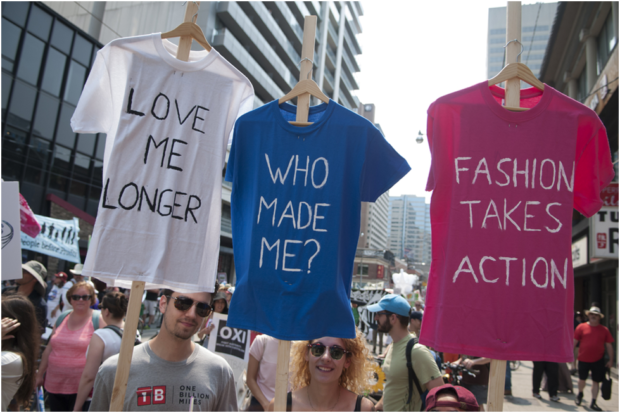How to Say ‘No’ to Overpriced, Mainstream Clothing Brands and ‘Yes’ to Sustainable Fashion

Popular fashion blogs such as Vogue, Who What Wear, and Elle may employ talented writers and be fun to read, but one thing needs to change. Often, they highlight a specific trend and then suggest links to outfits or accessories in that same post that are nothing like the style they’re featuring. These links direct readers to fashion that is either unattainable because of its price or unsustainable because of its environmental impact.
With advertisements such as this, these blogs seem to care more about making a buck than providing useful information. They regularly pass over emerging fashion designers and creative alternatives such as thrifting because these topics don’t pay. Until they hear us say “no” to the brands we can’t afford and the fast fashion that’s killing our planet, inauthentic marketing will continue to plague the industry.
Big fashion blogs don’t do enough to feature diverse brands
These big blogs aren’t digging deep enough to find the small businesses and diverse brands that many of us love. Instead, they’ll spot a celebrity wearing a designer label and talk about it for ages.
In most cases, younger and more diverse brands aren’t well known and, as a result, won’t receive celebrity endorsements. If people aren’t talking about a designer yet, the big fashion blogs don’t think they are trendy enough to mention.
Big fashion blogs repeatedly feature unattainable brands and fast fashion instead of more affordable, sustainable, and diverse brands — and I’m convinced there is a reason. I wonder if their affiliations with certain companies lead them to cover the same brands time and time again. This would explain why we don’t see a lot of variety.

Big fashion blogs market for mass appeal rather than being creative
Another problem is that the larger, more profitable fashion blogs tend to lack creativity, instead regurgitating the content they see on TikTok without forming their own opinions. It bothers me when blogs only mention the same brands over and over, especially when the familiar designers they direct us to are almost always overpriced, mainstream brands.
Data-conscious blogs are most likely coming up with topics by searching Google trends. In my opinion, this creates a loop of what’s considered “cool.” To avoid this on my blog, I wear, touch, or see everything I write about. If I can’t get my hands on it, I try to at least see it worn by an It-Girl.
Saying “yes” to affordable fashion
Fashion is all about style and personal expression. By supporting growing labels in addition to mainstream brands, we can add variety and a personal touch to our closets.
The big fashion blogs only focus on expensive, mainstream brands. I like to keep up with these designers, even when I can’t afford them, which is why my blog features a variety of designers and price ranges. Personally, I love the idea of coming to a blog, catching up on Chanel, and also learning about a new brand I might fall in love with. Up-and-coming brands are often the most creative and affordable designers in today’s fashion.
Trust me when I say that it takes work to say “no” to overpriced mainstream brands. My best advice to anyone seeking to do the same is to dig in and do your research. Try and find your style from emerging small businesses or brands you aren’t likely to see featured in Vogue.
I always try my best to keep my ears and eyes open. Whenever I see a great outfit, I track down the designer. I get particularly excited when it happens to be a diverse company no one is hearing about yet. That’s what the It Girl Guide is all about.

Saying “yes” to sustainable fashion
Affordability isn’t the only thing to look for when shopping; overpriced mainstream brands are also at the root of another industry problem known as “fast fashion,” the term used to describe the glut of mass-produced and poorly-made clothing people buy today and toss tomorrow. Because so many styles are here and gone, certain name brands regularly crank out cheap clothing just to meet increases in consumer demand.
The Environmental Protection Agency says that 85% of textile products find their way to landfills within a year. This equates to a garbage truck dumping a full load of clothing into the ground every second. Worse still, most of these shoes and clothes are made with non-biodegradable materials such as nylon, polyester, or elastics.
Fashion bloggers target the vast majority of this fast fashion to members of my own generation. They figure 18- to 24-year-olds have limited incomes and will be forced to settle, but that’s where they’re wrong.
Sustainable fashion is made to last and has a look that will always be in style. We know sustainable brands often have to reflect the cost of alternative materials, fair labor, and higher standards in their prices. Though we may not always be able to afford these brands, that doesn’t necessarily mean we aren’t interested in using our choices to protect the environment.
My generation has found creative ways to make fashion both sustainable and affordable. Thrifting and upcycling enables us to avoid supporting overpriced and fast-fashion mainstream brands.
The most affordable and sustainable fashion styles are waiting in unlikely places. Check out that cool vintage second-hand store in town, or shop online resellers such as Depop or Poshmark. Vintage pieces are a thrill to find and often just what you need to bring your aesthetic to life.
Support diverse and growing brands and say “no” to overpriced fashion
I am always on the lookout for brands that are just getting off the ground. Sometimes, the best outfits are from designers who are still virtually unheard of, so taking time to include these diverse brands in my blog benefits the designers as well as my readers.
In addition, I’m sharing the message that Gen Z is saying “no” to overpriced mainstream brands and fast fashion. We can easily jump on social media and show everyone how to create a fantastic outfit with alternative fashion that is both affordable and planet-friendly.
Our generation isn’t afraid to go outside the box and express our choices in the clothes and accessories we wear. When we say “no” to overpriced mainstream brands, we open the door to emerging designers who provide fashion we can afford. When we say “no” to fast fashion, we reduce the apparel industry’s harmful impact on our planet.
To learn more, visit The It Girl Guide — a blog by Gen Zers for Gen Zers.
This guest post was authored by Sky Haarsma

Sixteen-year-old Sky Haarsma did not want to return to her high school in Southern California when it opened back up during the pandemic. Instead, she enrolled in an online school and started her own fashion site, The It Girl Guide (TIGG). She was tired of hearing from out-of-touch fashion writers featuring topics for people older than her or designers that are out of reach for the average Gen Zer. Now TIGG is the go-to resource for attainable, trendy Gen Z fashion, beauty, and lifestyle content.
******
Ms. Career Girl strives to provide valuable insights you can use. To see more from our columnists and guest authors, check these out! Or subscribe to our weekly email featuring our latest articles. We’re also present on Medium!


